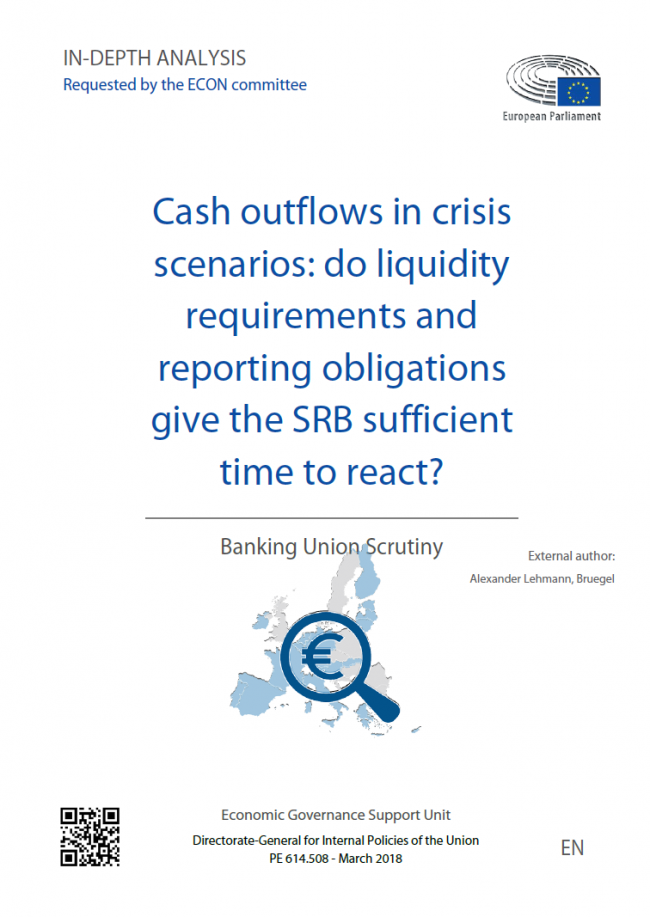External Publication
Cash outflows in crisis scenarios: do liquidity requirements and reporting obligations give the SRB sufficient time to react?
Bank failures have multiple causes though they are typically precipitated by a rapidly unfolding funding crisis. The European Union’s new prudential liquidity requirements offer some safeguards against risky funding models, but will not prevent such scenarios. The speed of events seen in the 2017 resolution of a Spanish bank offers a number of lessons for the further strengthening of the resolution framework within the euro area, in particular in terms of inter-agency coordination, the use of payments moratoria and funding of the resolution process.
This material was originally published in a paper provided at the request of the Committee on Economic and Monetary Affairs of the European Parliament and commissioned by the Directorate-General for Internal Policies of the Union and supervised by its Economic Governance Support Unit (EGOV). The opinions expressed in this document are the sole responsibility of the authors and do not necessarily represent the official position of the European Parliament. The original paper is available on the European Parliament’s webpage (here). © European Union, 2018
The European framework for bank resolution is now well established. It passed an important milestone with the resolution of a significant Spanish bank in 2017. However, the framework has been designed for slowly building solvency crises. In reality, most bank failures are precipitated by much more rapidly evolving liquidity crises, and might stretch the already complex process.
New rules on banks’ liquidity coverage came into effect in 2015 and offer some safeguards against overly risky funding models that were exposed in the financial crisis. After the long period of monetary easing, all banking systems and all large banks amply meet this requirement. The root causes of bank failures – lack of profitability and solvency, or sudden reputational or integrity problems – might nevertheless still precipitate a cash crisis, and banks are vulnerable to contagion from sovereign markets.
A distressed bank’s liquidity and the success of any resolution scheme will depend on both the bank’s own contingency funding plans and potential official liquidity assistance. Market confidence in liquidity provision before and after resolution will limit distressed asset sales, though clearly moral hazard from overly generous liquidity support needs to be minimised. The principles designed by the Financial Stability Board, and public sector funding backstops established in the United Kingdom and United States, offer valuable models in this area.
The European resolution framework is at present still poorly prepared for a liquidity crisis involving a large cross-border bank, let alone a more systemic crisis. Decentralised implementation of emergency liquidity assistance by individual central banks, and intervention in creditor rights through payments moratoria based on national law, are incompatible with the emerging integrated euro-area banking market.
The key aspects that should be reviewed in the ongoing work on completion of the banking union are:
i) strengthening of cooperation and information exchange between the European Central Bank and the Single Resolution Board, including by taking macro-prudential risks into account in planning the resolution of individual banks;
ii) harmonising the use of payments moratoria across the euro area, and extending their use throughout the resolution process and across all asset classes;
iii) establishing a credible and transparent liquidity backstop by the ECB to fund the resolution process, guaranteed by the Single Resolution Fund and national budgets.








